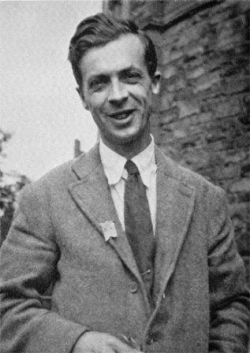Julian Huxley

- Born
- 22 June 1887
- Died
- 14 February 1975 (age 87)
Julian Huxley was a twentieth century English biologist whose work greatly influenced scientific developments in evolution, embryology and studies of behaviour. He also co-founded the World Wildlife Fund, now known as WWF, a leading organisation in wildlife conservation.
Huxley was brought up in one of the most intellectually impressive families of the 19th and 20th centuries. His grandfather was Thomas Henry Huxley, a biologist and work colleague of Charles Darwin, with whom Julian Huxley spent a lot of time as a boy and first got inspired into science. Following on from his grandfather’s work, Huxley himself became an immensely important biologist, especially in the field of evolution.
While at boarding school at Eton, Huxley became interested in ornithology, the study of birds. Following his passions, he went on to study zoology at Balliol College, Oxford, and developed an interest in embryology, the development of the embryo and fetus. With strong foundations in biology, his research went on to include hormones, developmental processes and ethology (animal behaviour), and he lectured at Rice University in Texas and King’s College, London.
Huxley was one of the first people to argue that natural selection was the driving force behind the development of all species. In the 1940s, he coined the term ‘evolutionary synthesis’, his most important contribution to science. Evolutionary synthesis was a model that put together the previous work on evolution into one theory. It built upon the work of scientists like Darwin and Mendel and unified taxonomy and genetics. The theory also helped to bring together many evolutionary biologists, ecologists and botanists in the early 20th century to work together to create a clear idea of evolution and how it works.
Human potentialities constitute the world's greatest resource, but at the moment only a tiny fraction of them is being realised.
Julian Huxley, The New Divinity in Essays of a Humanist, 1964.
In 1961 Huxley co-founded the World Wildlife Fund (WWF) which has become the world’s leading independent conservation organisation. In 1946 he was also the first director general of the United Nations Educational, Scientific and Cultural Organization (UNESCO), an organisation working to establish global peace on the basis of ‘humanity’s moral and intellectual solidarity’. Huxley received a knighthood in 1958 for his contributions to society.
Throughout Huxley’s writings there was a perennial frustration. He felt that humans harbour so much knowledge and talent, yet leave much communal potential untapped. The solution to Huxley was simple; the way in which people were made up both collectively and individually needed to change in order to make a fairer world. He thought that the application of scientific knowledge would allow people to alter themselves and their environment.
This profile was written by a Biology: Changing the World volunteer.



